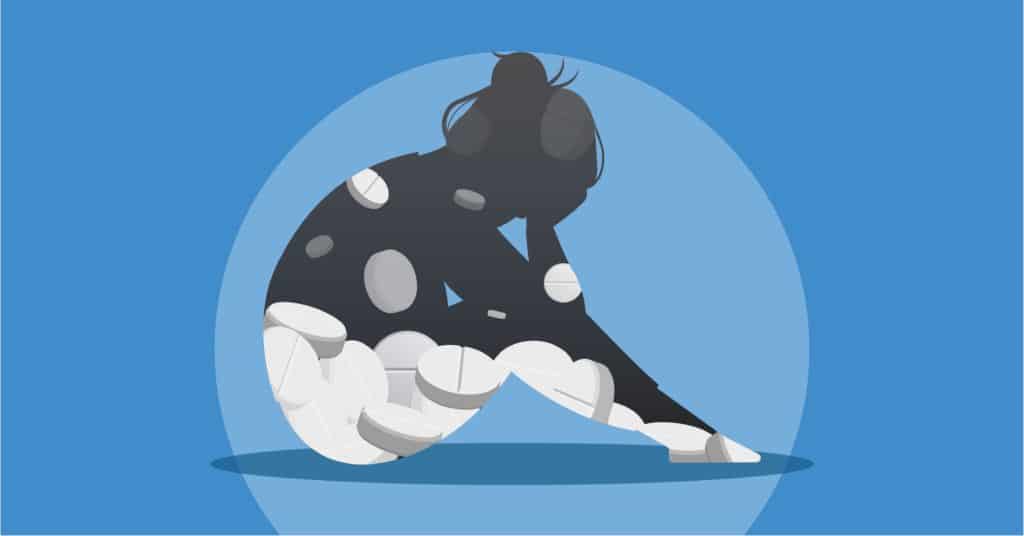Benzodiazepines are sedatives and tranquilizers prescribed to treat symptoms of insomnia, anxiety, panic, seizure disorders, and muscle tensions or spasms. They are classified as Schedule IV controlled substances as per the Drug Enforcement Administration (DEA). Common benzodiazepines include Xanax (alprazolam), Klonopin (clonazepam), Restoril (temazepam), Ativan (lorazepam), and Valium (diazepam).
When the use of benzodiazepines suddenly ceases or the familiar dose is significantly cut down, as with any other addictive substance, withdrawal symptoms typically emerge — and can soon turn deadly. Benzodiazepine withdrawal is especially dangerous because of the high risk of seizures, coma, and even death. Respiratory failure is also possible, especially when benzodiazepines are combined with alcohol, opioids, or other CNS Depressants.
Jump To Section
What Risks Come With Benzodiazepine Withdrawal?
There is no specific timeline dictating exactly how long withdrawal will last. While each individual may experience withdrawal differently, certain estimations can be made. Benzodiazepine withdrawal duration and intensity depend on several factors, including:
- Length of time taking benzodiazepines
- Dosage amount
- Type of drug used/abused
- The method used to take or abuse benzodiazepines
- Underlying medical or mental health issues
- Abuse of other drugs or alcohol concurrently
Symptoms of Benzodiazepine Withdrawal
The symptoms of benzodiazepine withdrawal can vary, depending on many factors. Benzodiazepines are generally not intended for long-term use. Withdrawal symptoms may begin after as little as 3–6 weeks of use, even when a person uses the drugs as the doctor directed.
Withdrawal symptoms may be mild in people who take the drugs for short periods. However, there is still a possibility of severe reactions and withdrawal symptoms. Research showed that 40% of people taking benzos for longer than 6 months experienced moderate-to-severe withdrawal symptoms.
Although not everyone will experience the same symptoms, some are more common. These include:
- physical aches and pains that can range from uncomfortable to severe
- abnormal sensations, such as the feeling that bugs are crawling on the skin
- muscle spasms
- hyperventilation
- sweating
- weight loss
- anorexia
- anxiety attacks
- trouble concentrating
- hypersensitivity
- nausea
- vomiting
- insomnia
- panic attacks
- grand mal seizures
- detachment from reality
- depression
- hallucinations or delusions
Along with these symptoms, the person may experience severe cravings for the drug or other drugs to sedate them. These cravings can easily lead to the recurrence of use.
Benzo Withdrawal Timeline
Early benzodiazepine withdrawal symptoms can appear within a few hours of stopping relatively short-acting drugs such as Xanax, Ativan, and Restoril. Associated withdrawal symptoms may gradually worsen until they generally reach a peak on day 2 and slowly improve over the next 2 or 3 days. Acute withdrawal from shorter-acting benzodiazepines might be expected to last between 2 and 4 weeks.
Early benzodiazepine withdrawal symptoms take longer to appear when stopping relatively longer-acting drugs such as Valium and Librium (chlordiazepoxide). The withdrawal associated with these longer-acting benzos may not begin until between 2 days and a week after use is stopped, with symptoms increasing in intensity until they reach a peak after 2 weeks of abstinence and slowly improving over the next week or two. Acute withdrawal from long-acting benzodiazepines can last between 2 and 8 weeks.
Individuals taking benzos for several months or more and in high doses are likely to experience more withdrawal symptoms that last longer than those taking smaller doses for a shorter length of time. For example, the U.S. Food and Drug Administration (FDA) reported that patients taking doses of 4 mg/day or higher of Xanax for longer than three months were more likely to become dependent on the drug and therefore more likely to experience more uncomfortable withdrawal symptoms than those taking smaller doses for less time.
The method of ingestion is also related to the onset of withdrawal. For instance, snorting or injecting benzos sends the drugs straight into the bloodstream to take almost instant effect. Ingesting a pill requires that it be digested through the digestive tract, which creates a less intense high and slower onset of withdrawal symptoms.
Coping Strategies
In most cases of benzo withdrawal, suddenly stopping the medication is not recommended, as it can be dangerous. Benzo withdrawals can be severe, and life-threatening complications can occur. A healthcare professional should supervise benzo withdrawal to help monitor and manage the symptoms.
Medical Detox
Medical detox may help the person manage their specific withdrawal symptoms. Medical detox involves tapering off the benzo drug under the supervision of a doctor. Tapering the drug by slowly reducing the prescription strength may help make withdrawal symptoms much easier to manage. Additionally, medical supervision allows doctors to respond much more quickly to potential side effects and withdrawal symptoms.
Medications That Help Benzo Withdrawal
If withdrawal symptoms become severe, doctors may prescribe other medications. They will make this decision on a case-by-case basis, depending on the type and severity of the symptoms affecting the individual.
If the person’s original symptoms return once they stop taking prescription benzodiazepines, doctors may also prescribe a different class of medications, or other drugs or therapies, to help manage them during withdrawal. For example, doctors may recommend flumazenil (Romazicon) to help with severe withdrawal symptoms and other drugs, such as buspirone (BuSpar), to help people with severe anxiety symptoms.
Get Help For Benzo Withdrawal
Therapies, including counselling and cognitive behavioral therapy (CBT), may be helpful for people looking to manage symptoms without solely relying on other drugs to acheive long term sobriety. Managing symptoms is important to help prevent recurrence of use/misuse. Relapse rates for many individuals struggling with benzodiazepine addiction are high. If you are worried about going through withdrawal, we can help. Don’t hesitate to contact us today.
















